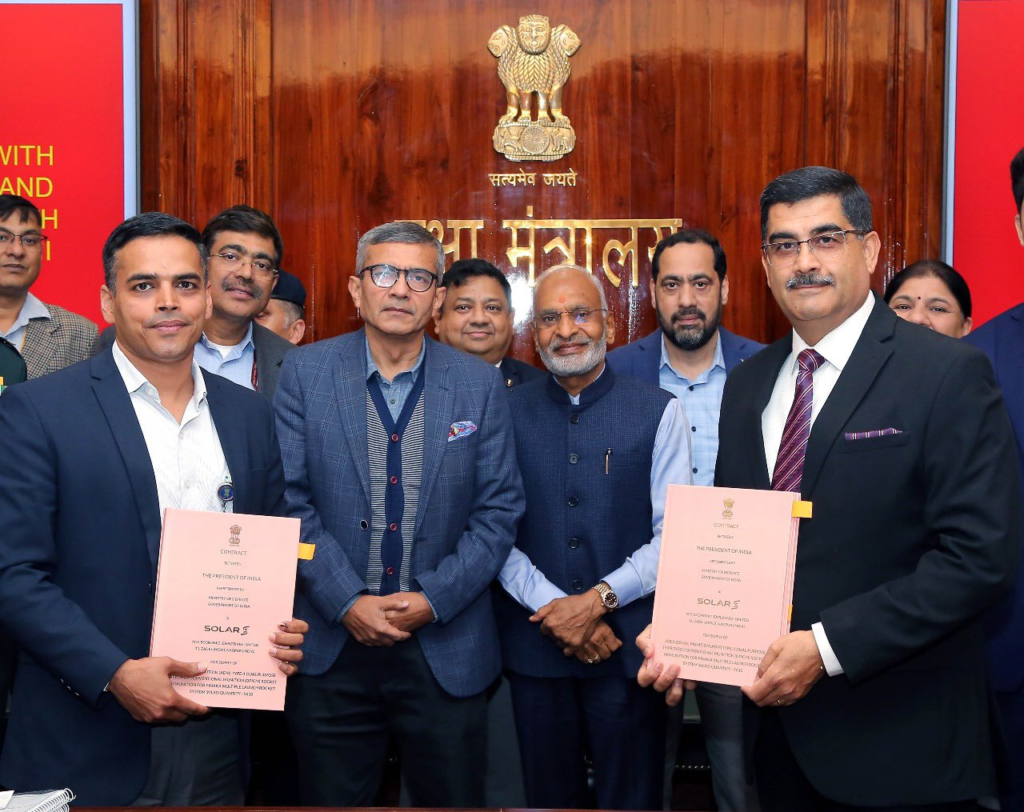India’s Defence Ministry recently signed contracts worth Rs 10,147 crore with Economic Explosives Limited (EEL), Munitions India Limited (MIL), and Bharat Electronics Limited (BEL) to bolster the firepower capabilities of the Indian Army, reported the ministry. This procurement focuses on advanced ammunition for the indigenously developed Pinaka Multiple Launch Rocket System (MLRS) and upgrades to Shakti software. The initiative is undertaken for the modernisation of the Army’s artillery regiments and the promotion of ‘aatmanirbhar’ principle for self-reliance in defence manufacturing.
The contract with EEL and MIL covers the supply of Area Denial Munition (ADM) Type-1 (DPICM) and High Explosive Pre-Fragmented (HEPF) Mk-1 (Enhanced) rockets. ADM Type-1 rockets are equipped with specialised warheads designed to deploy sub-munitions over a wide area, effectively targeting mechanised forces, vehicles, and personnel. This capability is critical for denying key strategic zones to enemy forces. Meanwhile, the HEPF Mk-1 (Enhanced) rockets offer an advanced version of in-service HEPF rockets. With an extended range and improved precision, they enable deep strikes into enemy territory, significantly enhancing the Army’s long-range offensive capabilities.

In addition to ammunition procurement, Bharat Electronics Limited will upgrade the Shakti software, a crucial component for modernising the Pinaka system. This upgrade will improve the operational efficiency and fire control systems of the artillery regiments, ensuring more accurate and responsive deployment in combat scenarios.
The contracts were signed in the presence of Defence Secretary Rajesh Kumar Singh in New Delhi. Officials from the Ministry of Defence stated that these acquisitions are pivotal for enhancing the Army’s combat readiness and increasing the lethality of its artillery regiments. The new ammunition and software upgrades are expected to significantly boost the Army’s operational capabilities and improve its ability to respond to evolving threats.
Beyond defence modernisation, the project is poised to create substantial employment opportunities. The manufacturing process will involve multiple components sourced from India’s growing Micro, Small, and Medium Enterprises (MSME) sector, further strengthening the domestic defence manufacturing ecosystem. This aligns with the government’s ‘Aatmanirbhar Bharat’ initiative, which aims to reduce India’s dependency on foreign defence imports and promote indigenous production.
The Indian government has taken several steps in recent years to encourage self-reliance in defence, including phased import bans, increased foreign direct investment, and a dedicated budget for domestic military hardware procurement. The latest contracts underscore India’s commitment to enhancing its defence infrastructure while fostering local industry growth.



